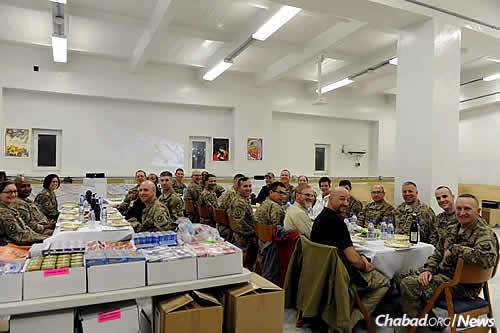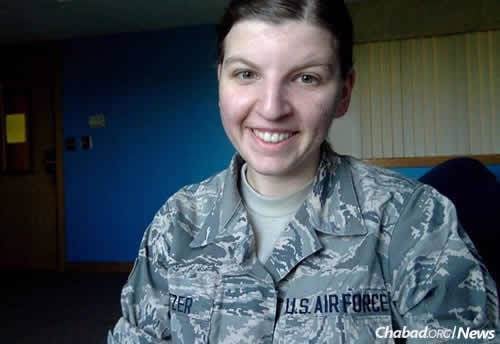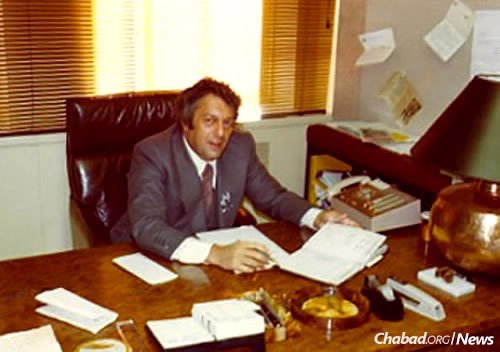The cleaning, cooking, getting rid of all chametz, setting the table, organizing the seder . . . If you think it’s hard preparing for Passover, try doing it 500 nautical miles away from shore on an aircraft carrier.
Lt. Nicholas Fritzhand is up to the task.
By day, Fritzhand is a weapon-systems officer: “the backseater,” he says, in fighter jets. He also oversees about 30 sailors. On Monday, April 10, Fritzhand will use such leadership skills to run a Passover seder aboard the U.S.S. Nimitz, the oldest U.S. aircraft carrier in operation and one of the largest warships ever built.
Despite the ship’s massive size, “finding a space to have the seder itself will be a challenge,” Fritzhand tells Chabad.org. The crew numbers more than 5,000; add to that the provisions they need for weeks at sea and all the necessary military equipment, making every inch of space used for goods and materials. Still, he says, “there are a couple of options I’m exploring, including having it in our ready-room space or a special part of the mess deck.”
Fritzhand grew up in Cincinnati and celebrated his bar mitzvah in a suburb called Wyoming. His involvement with Judaism grew as he did—through a powerful Taglit-Birthright Israel trip, studying Torah while attending the University of Pennsylvania and undertaking a post-graduate year of yeshivah studies.
He says that during the past six years of military service: “I strive to put on tefillin as much as I can and attend Friday-night services here on the boat with one or two others when I’m not flying. My time in the U.S. Navy, and more specifically, being stationed in places without a substantial Jewish presence for the first time in my life, has given me an added appreciation of Jewishness and its role in my life.”

Last year, nearly 50 members of Fritzhand’s squadron celebrated Passover together at a house close to the base. “It was awesome sharing our history and culture and general Yiddishkeit with so many of my brothers- and sisters-in-arms,” he relates. That experience inspired him to organize a Jewish-holiday celebration this year.
But the challenge of leading a seder aboard the Nimitz doesn’t end with finding space. “There are no kosher kitchens on board,” says Fritzhand. Fortunately, he adds, “the Aleph Institute has sent everything we need to have a kosher seder, including matzah.”
Aleph, founded in 1981 at the direction of the Lubavitcher Rebbe—Rabbi Menachem M. Schneerson, of righteous memory—provides financial, emotional and spiritual assistance to Jews serving in all branches of the U.S. military and to those in prisons throughout the United States, as well as their families.
“We are sending supplies for more than 500 Passover seders across the globe,” says Rabbi Menachem Katz, director of Prison and Military Outreach of the organization based in Surfside, Fla. “This will serve about 5,000 people.”
Supplies include Haggadahs, seder plates, boxes of shmurah matzah, charoset, gefilte fish, chicken soup and mashed potatoes. “Everything is shelf-stable,” notes Katz. “Getting things to Syria and to ships in the middle of Arabian Sea is not easy, but we ship very early and only via priority mail.”

‘The Mission of Preserving Freedom’
“It may not be the fanciest of seders, but we have the basic supplies, so we will make it work,” says Airman 1st Class Mariel Meltzer. “When you are in an isolated location, it doesn’t matter if you have a white tablecloth, a big meal or even someone who can sing on key. If there are Jews, matzah and a kosher-for-Passover MRE [Meals Ready to Eat, standard military fare], that’s all you need.”
Meltzer’s family lives in Boston, though the 23-year-old will be celebrating the eight-day holiday in North Dakota, where she works as a knowledge-management technician in the U.S. Air Force. She defines that as being responsible for “all matters regarding the reception and distribution of mission-critical data and information resources.”
She also volunteers as a Jewish lay leader, and has been trained and endorsed by the Aleph Institute to ensure that Jewish personnel on the base have their religious needs provided for.

“Being away from a Jewish community for the holidays has really taught me perspective,” she says. “My family has always had large seders: My mom is an amazing cook; my dad and one of his longtime friends always argue about which tunes to use; my cousins used to make me crazy. I always took that for granted.”
But more than the food and the singing, she focuses on the relevance of the holiday’s message.
“During Passover, we celebrate our liberation from Egypt,” says Meltzer. “When you serve, you become increasingly aware that freedom is hard-won, but it’s also important to maintain that freedom. It’s not a one-and-done deal; it’s a constant journey. I am increasingly grateful, but also really humbled, to be a part of the team tasked with the mission of preserving freedom.”

Also This Week:
The Day Crown Heights Kosher Knishes Were Trucked to Capitol Hill

A 1983 ‘New York Times’ report on how the White House honored the Rebbe's 81st birthday.
Also This Week:
Eco-Friendly Day School in Portland, Ore., Tapped for National Accreditation

A center for Jewish life on an extended wooded campus serves the entire community
Also This Week:
Bursting at the Seams, The Shul of Bal Harbour Gets a $20 Million Addition

Florida congregation continues exponential growth, especially among the young.
Also This Week:
A Fitting Tribute to the ‘King of Pants’

Gene Kule was a garment-industry legend who saw a kindred spirit in a young Chabad rabbi.
Also This Week:
Passover ‘Escape Room’ Launches for Jewish Kids Worldwide

An effort to break free, focusing on themes of the holiday and a look into the past








Join the Discussion